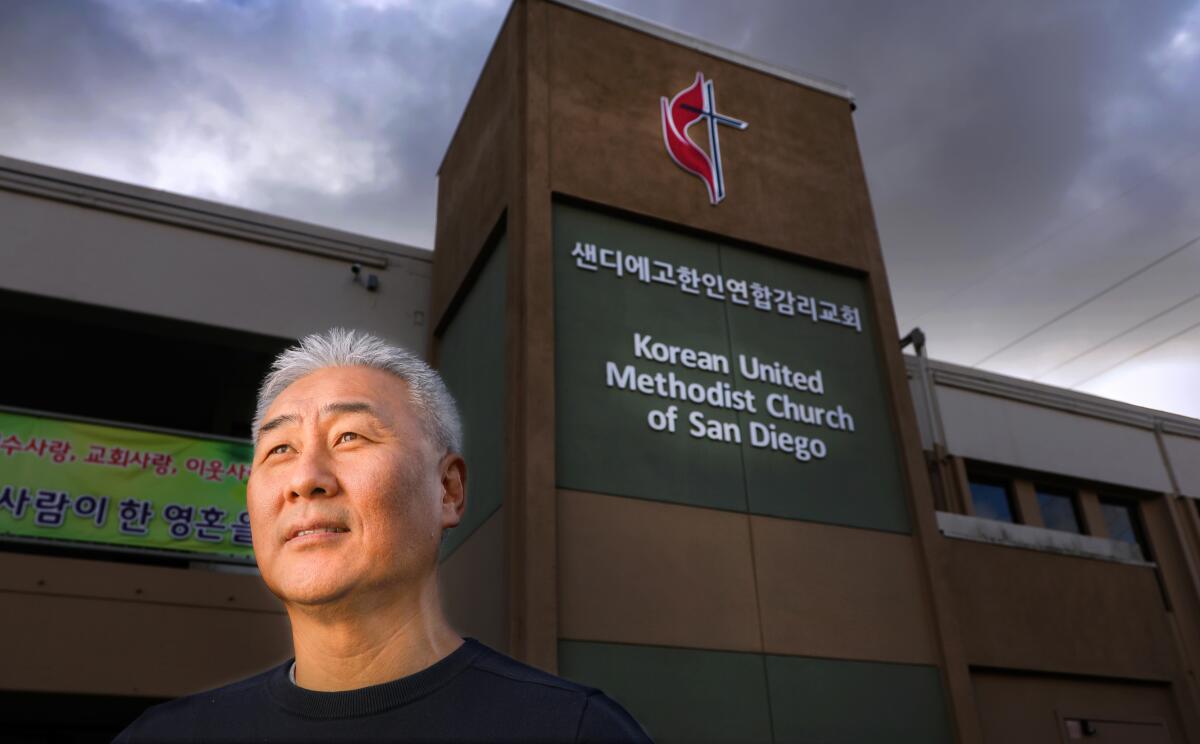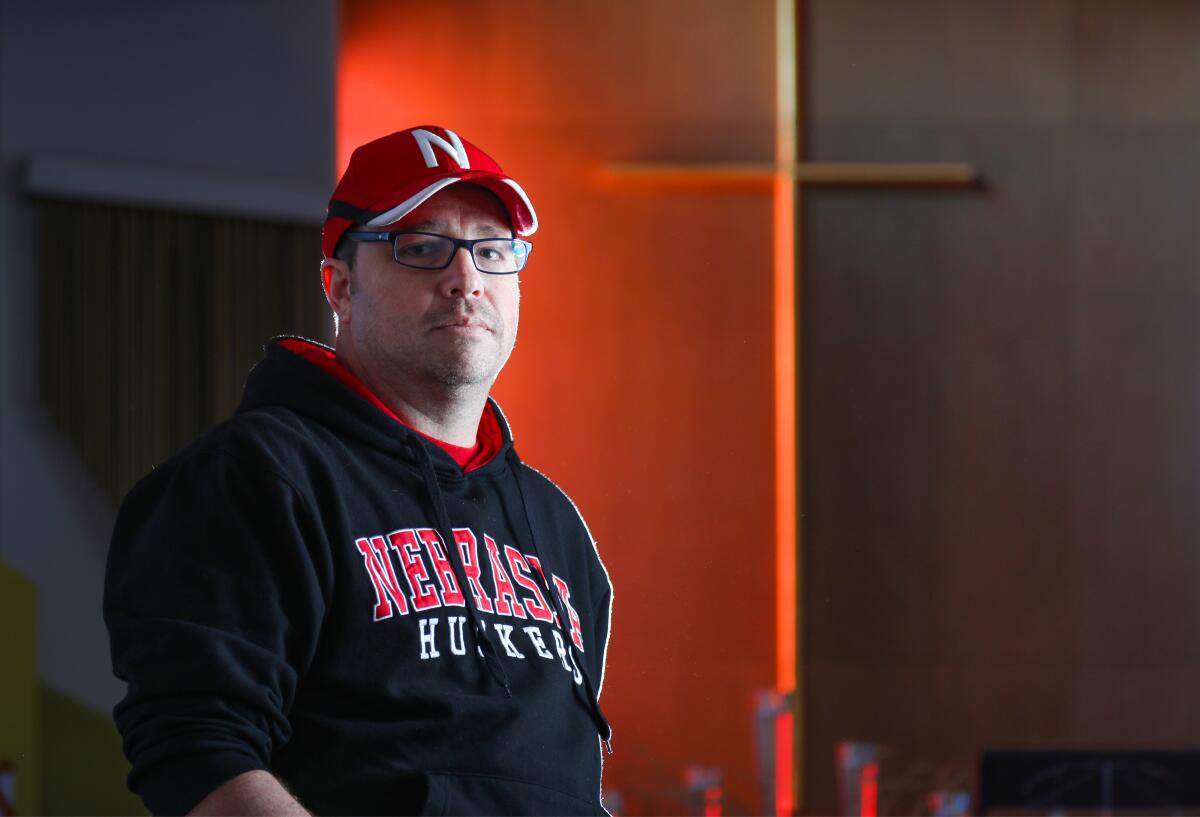Can this church be saved? Split on LGBTQ issues, United Methodists consider divorce

SAN DIEGO — Sexual issues lead to many divorces, including the threatened split in the United Methodist Church. Divided on same-sex marriage and the status of LGBTQ believers, the nation’s third-largest Christian denomination — after Catholicism and the Southern Baptist Convention — may soon break up.
“No one celebrates separation. I certainly do not,” said the Rev. Jonathan Park, associate pastor of the Korean United Methodist Church of San Diego, a traditionalist congregation. “But I believe it is inevitable.”
The Rev. Bob Rhodes, whose leadership of the progressive Pacific Beach United Methodist Church has not prevented a close friendship with Park, agreed. For years, he had hoped the church’s feuding wings could coexist.
“Then a friend asked if I were counseling a couple where one was abusing the other, would I counsel them to stay together?” Rhodes said. “I think both sides feel they have been abused by the other.”
While this debate has simmered since the church’s 1972 declaration that homosexual acts are “incompatible with Christian teaching,” it recently gained new urgency. On Jan. 3, a committee representing progressive, traditionalist and centrist church leaders issued a nine-page “Protocol of Reconciliation and Grace through Separation.” If approved during the church’s General Conference in Minneapolis this May, the traditionalists will form a new denomination.

“It’s just time to move on,” said the Rev. Glen Haworth, lead pastor of the Fount in Fountain Valley and president of the California-Pacific chapter of the Wesleyan Covenant Assn., a traditionalist group. “We can’t do our mission. We are too busy fighting.”
For a mainline Protestant denomination with a history spanning three centuries, this is a spiritual crisis. Division has come as church membership, shrinking in the U.S., is growing in Africa and Asia. Both traditionalists and progressives say acrimonious arguments are distracting from Methodists’ work fighting poverty and responding to natural disasters. UMCOR, the United Methodist Committee on Relief, is now assisting earthquake victims in Puerto Rico and educating leaders at Zimbabwe’s Africa University.
“People wonder, why is this the thing that we are known for, isn’t Christianity much bigger than LGBTQ issues?” said Ron Benefiel, a professor of sociology and theology at Point Loma Nazarene University. “Isn’t Christianity about God and Jesus? But this is the issue that has come to them.”
Four sources, six verses
The church traces its roots to 18th century England, when an Oxford don and ordained Anglican priest urged the reformation of his own church.
John Wesley, with his brother Charles and other adherents, preached “practical divinity” to coal miners, blacksmiths and other blue-collar workers. They recognized women as ministers and devised ways — methods — to put the Gospel into practice in the here and now.
“At the heart of it is holiness, calling people to a new faith or a new conversion but also a character change, to love God and love neighbor,” Benefiel said. “It’s not just what you believe, but who you become.”
Methodism’s birth coincided with the colonization of North America, and the new faith soon immigrated to the New World. In the following centuries, there were divisions and additions — the Wesleyan Church broke away in the 19th century, and the current United Methodist Church was created by the 1968 merger of Methodist and Evangelical United Brethren churches.
All are influenced by Wesley and what’s called the Wesleyan Quadrilateral. Believers seeking the will of God are directed to four sources: Scripture, tradition, reason and experience.
“We use all of that,” Park said. “But I think the traditionalists would say Scripture remains the primary source about what we know about God. My progressive friends also believe that, but they would say a lot of that is contextual.”
Context, Rhodes argued, is essential. Bible verses have been used to justify slavery and other practices we no longer accept, he said, so Scripture must be read in light of the author’s culture and what we understand today.
“We can take and twist the Scripture to justify some terrible things,” Rhodes said.
The Old and New Testament combined, Rhodes said, have six verses relating to homosexuality. While all of them condemn same-sex practices, Rhodes has been influenced by experience and reason, he said. A minister since 2011 and Pacific Beach’s pastor since 2014, he has been impressed by the devotion of many congregation members, regardless of who they love.
“I see God’s spirit moving in these people, whether gay or straight or bisexual or transgender,” said Rhodes, who is straight and married. “Who am I to question God? If God is empowering and enriching and sustaining gay and lesbian people, who am I to say God is wrong?”
Under a previous pastor, Pacific Beach UMC became a “reconciling church,” adopting a formal statement welcoming believers of all sexual orientations. That meant more to Ron Jessee than the overall denomination’s stance.
“What’s important to me is, what is this congregation doing?” said Jessee, the church’s music director and a gay man.
Not everyone was reconciled to Pacific Beach’s status as a reconciling church. Jessee, who has worshipped here for 35 years, estimated that the 15 congregants who left in protest were replaced by another 150, most of whom were not part of the LGBTQ community. “There were a lot of straight people who came here,” Jessee said, “because they wanted to be in a church that welcomed their GLBT brothers and sisters.”
Human condition
Despite the focus on sexuality, Park sees a larger underlying issue: theological drift.
“What it comes down to,” the pastor said, “is how you view Scripture.”
Traditionalists such as Park insist that Scripture is primary, outweighing the other three sides of Wesley’s Quadrilateral. Progressives also embrace the Bible, Park said, but he believes they’ve drifted away from a traditional understanding of these sacred texts. Was Jesus bodily resurrected? Did Mary conceive through God’s direct intercession or did the Almighty use a human surrogate, Joseph?
While progressives and centrists might question the literal meanings of Biblical texts, Park said, traditionalists don’t. Take, for example, the verses on homosexuality.
“We cannot say something is not sinful if that is what the Bible is teaching,” Park said. “And we cannot teach something or espouse something if it is not in Scripture.”
Still, he understands the views of his friend, Rhodes, and other progressives: “They cannot continue to call something sin that they do not see as sin.”
Park’s congregation contains first-generation Korean immigrants and Korean Americans whose families have lived here for generations. There’s also the entire spectrum of human sexuality, and Park insisted that all are welcomed and valued. He has counseled gay Methodists, urging them to accept their sexuality while living celibate lives.
“I would never try to change their orientation,” he said. “Being tempted one way or the other, for women or for men, that is just part of the human condition. We all struggle with human desire. But what we give ourselves to, what we practice, that is the issue.”
Amicable divorce?
Traditionalists note that 1972 statement on homosexuality being “incompatible” with Christian practice was prefaced by an acknowledgment of homosexuals’ “sacred worth” and need for “ministry and guidance of the church in their struggles for human fulfillment...”
Yet the “incompatible” language has been challenged at every General Conference ever since it was introduced. (Deliberative meetings of Methodist leaders from around the world, General Conferences are ordinarily held every four years.) The language has survived. At a special conference last year called to address LGBTQ issues, the progressives lost again, in part due to opposition from conservative leaders from Africa, the Philippines and Korea.
“There is irony in all this,” said Benefiel, the Point Loma Nazarene professor. “The progressives are the ones that are making the argument for diversity, yet it is the diversity of the church that is making it more traditional.”
Another wrinkle: while the traditionalists marshaled the General Conference votes, they’ve been unable to enforce bans against same-sex marriage or the ordination of LGBTQ ministers. That’s because most U.S. bishops are aligned with the progressives. And that’s why many traditionalists, despite their strength in church-wide assemblies, are preparing to leave.
“We realize that even if we continue — and we could continue because the numbers from Africa are growing — if the bishops are not willing to enforce this, there’s no point,” said Haworth, of the Wesleyan Covenant Assn.
While a formal vote on separation will not be taken until May, Haworth, Park and Rhodes all predict it will be approved. One potential sticking point has already been resolved: while individual churches and their properties are held in trust by the denomination, the measure before the General Conference allows departing churches to keep their real estate and physical structures.
Still, will this be an amicable divorce?
“How can we do this in the most Christian way possible, with the least amount of anger and hurt feelings?” Park said. “Can we do this and bless one another?”
While Park plans to minister to a congregation devoted to traditional Methodism, he’s not willing to condemn others who are called to a more progressive form of this faith.
“This is who we are,” he said. “If this is not who you are, I have this great friend, Bob. And if that is where you are, I could heartily recommend him.”
More to Read
Sign up for Essential California
The most important California stories and recommendations in your inbox every morning.
You may occasionally receive promotional content from the Los Angeles Times.











